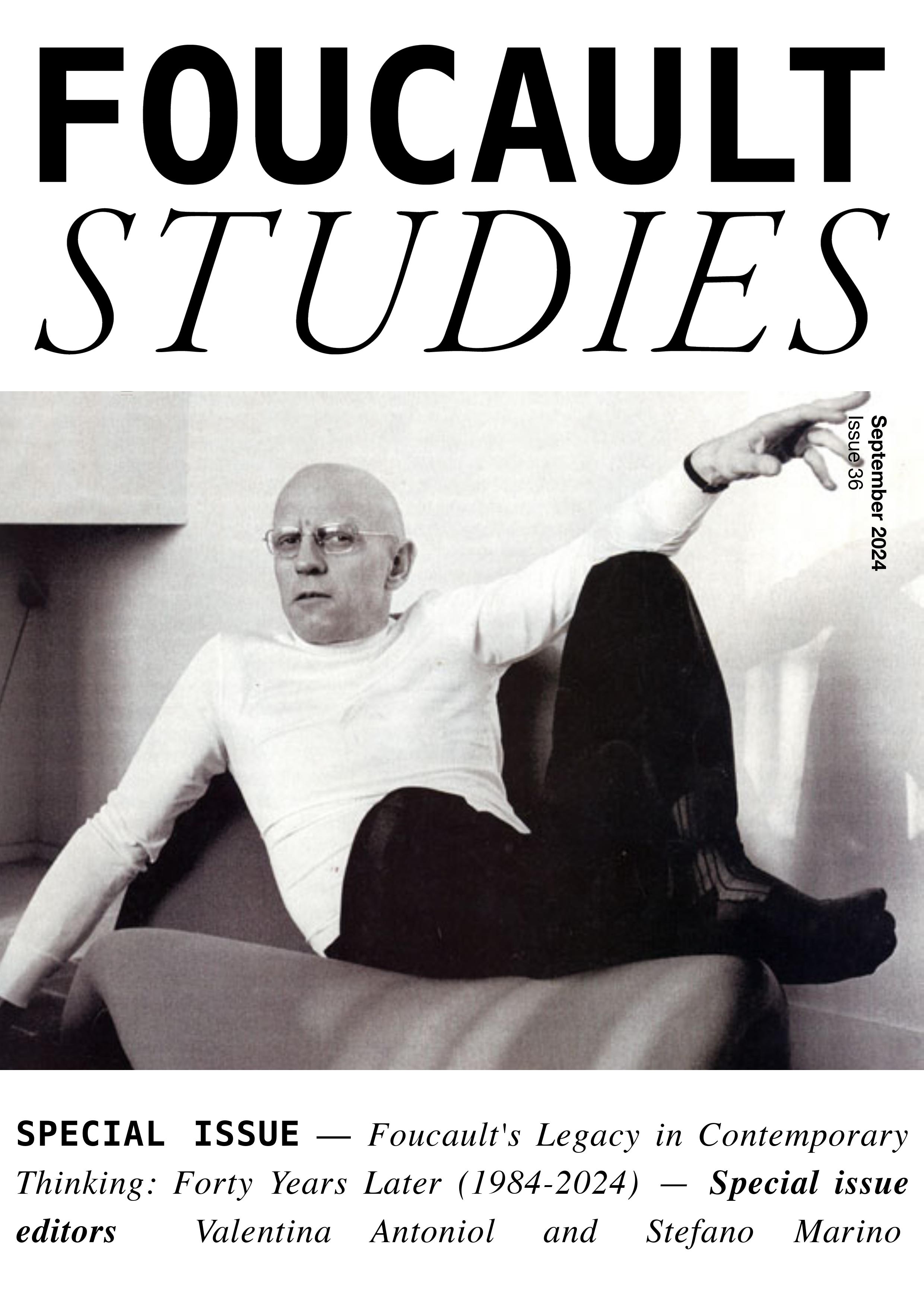On Foucault’s Legacy: Governmentality, Critique and Subjectivation as Conceptual Tools for Understanding Neoliberalism
DOI:
https://doi.org/10.22439/fs.i36.7229Keywords:
Foucault, neoliberalism, governmentality, critique, subjectivationAbstract
The text addresses Foucault’s critical understanding of neoliberalism as a new contemporary governmentality strategy for the conduction of people’s lives. A major aspect of Foucault’s analysis of neoliberalism relies on his understanding of the neoliberal homo oeconomicus as dependent on subjectivation processes related to self-assumed values and standards oriented by the competitive economic market. Our hypothesis is that governmentality, critique and subjectivation are the core notions that shaped Foucault’s understanding of neoliberalism and form the legacy of his seminal analysis. Contrary to critics who affirm that Foucault flirted or even became fascinated with neoliberalism, we argue that he offered critical tools for its understanding in a critique that is not to be confused with denunciation, however. Accordingly, we discuss Foucault’s conception of critique and relate his analysis of neoliberalism to his notions of governmentality and subjectivation. Finally, we briefly point out how some contemporary critics of the neoliberal order have appropriated and developed Foucault’s conceptual tools in their own understanding of it. We conclude that although Foucault did not propose a comprehensive theory of neoliberalism, he offered important critical insights for the understanding of it in our times.
References
Behrent, Michael, "Liberalism without humanism: Michel Foucault and the free-market creed, 1976-1979," Modern Intellectual History 6:3 (2009), 539-568. https://doi.org/10.1017/S1479244309990175
Brown, Wendy, "American nightmare: neoliberalism, neoconservatism, and de-democratization," Political Theory 34:6 (2006), 690-714. https://doi.org/10.1177/0090591706293016
Brown, Wendy, Edgework. Critical Essays on Knowledge and Politics. Princeton and Oxford: Princeton University Press, 2005.
Brown, Wendy, Undoing the Demos. Neoliberalism Stealth Revolution. New York: Zone Books 2015. https://doi.org/10.2307/j.ctt17kk9p8
Butler, Judith, Notes toward a Performative Theory of Assembly. Cambridge, MA: Harvard University Press, 2015. https://doi.org/10.4159/9780674495548
Cultural Studies, "Edges Blog: CSC interviews Daniel Zamora," culturalstudies.gmu.edu (2016). http://culturalstudies.gmu.edu/articles/9276 (accessed 01/22/2024)
Dardot, Pierre, and Christian Laval, The New Way of the World: On Neoliberal Society. Lon-don: Verso, 2013.
Duarte, André, Pandemic and Crisis of Democracy: Biopolitics, Neoliberalism, and Necropoli-tics in Bolsonaro's Brazil. New York and London: Routledge, 2023. https://doi.org/10.4324/9781003295525
Foucault, Michel, Language, Counter-Memory, Practice. Selected Essays and Interviews, ed. Donald F. Bouchard, trans. Donald F. Bouchard and Sherry Simon. Ithaca, NY: Cornell University Press, 1977.
Foucault, Michel, "The Subject and Power," in Beyond Structuralism and Hermeneutics, eds. Hubert Dreyfus and Paul Rabinow. Chicago: University of Chicago, 1983.
Foucault, Michel, "Preface" [1977], in Anti-Oedipus. Capitalism and Schizophrenia, Gilles Deleuze and Felix Guattari, trans. Robert Hurley, Mark Seem, and Helen R. Lane. Minneapolis: University of Minnesota Press, 1983.
Foucault, Michel, History of Sexuality. An introduction [1976], trans Robert Hurley. New York: Vintage Books 1990.
Foucault, Michel, "La philosophie analitique du pouvoir," in Dits et Écrits, vol. III. Paris: Gallimard, 1994.
Foucault, Michel, Dits et Écrits, vol. IV. Paris: Gallimard, 1994.
Foucault, Michel, Society Must be Defended. Lectures at the Collège de France 1975-1976 [1997], ed. Mauro Bertani, Alessandro Fontana, François Ewald, Alessandro Fontana, Arnold I. Davidson, trans. David Macey. New York: Picador, 2003.
Foucault, Michel, The Birth of Biopolitics. Lecture at the Collège de France 1978-1979 [2004], ed. Michel Sennelart, trans. Graham Burchell. New York: Palgrave Macmillan, 2008.
Foucault, Michel, Security, Territory, Population. Lectures at the Collège de France 1977-1978, [2004], ed. Michel Sennelart, trans. Graham Burchell. New York: Palgrave Macmillan, 2009.
Foucault, Michel, Discipline and Punishment. The Birth of Prison [1975], trans. Alan Sheri-dan. New York: Vintage Books, 2012.
Foucault, Michel, What is Critique? and The Culture of the Self, ed. Fruchaud, Henri-Paul, Daniele Lorenzini and Arnold Davidson, trans. Claire O'Farrel. Kindle Edition. Chica-go: University of Chicago Press, 2024. https://doi.org/10.7208/chicago/9780226383583.001.0001
Gros, Frédéric, "Course Context" [2009], in The Courage of the Truth. The Government of Delf and Others. Lectures at the Collège de France, 1983-1984, ed. Frédéric Gros, François Ewald, Alessandro Fontana, and Arnold I. Davidson. New York: Picador, 2011.
Lorenzini, Daniele and Tuomo Tiisala, "The architectonic of Foucault's critique," European Journal of Philosophy (2023), 1-16. https://doi.org/10.1111/ejop.12877
Sabot, Philippe, "Avec Foucault, penser la 'critique'," phillippesabot.over-blog.com (2012). http://philippesabot.over-blog.com/article-penser-la-critique-foucault-103354284.html (accessed 01/30/2024)
Sennelart, Michel, "Course Context," in Security, Territory, Population. Lectures at the Collège de France 1977-1978, ed. Michel Sennelart, trans. Graham Burchell. New York: Palgrave Macmillan, 2009.
Zamora, Daniel, and Michael C. Behrent, Foucault and Neoliberalism. Cambridge: Polity Press, 2016. Wiley, Kindle edition.
Downloads
Published
How to Cite
Issue
Section
License
Copyright (c) 2024 The Author(s)

This work is licensed under a Creative Commons Attribution-NonCommercial-NoDerivatives 4.0 International License.
Authors retain copyright to their work, but assign the right of the first publication to Foucault Studies. The work is subject to a CC BY-NC-ND 4.0 license, but despite these restrictions, authors can take for granted that Foucault Studies will permit articles published in Foucault Studies to be translated or reprinted in another format such as a book providing a full reference is made to Foucault Studies as the original place of publication.



